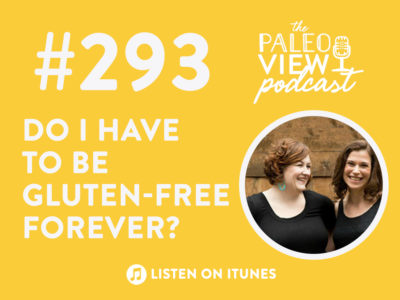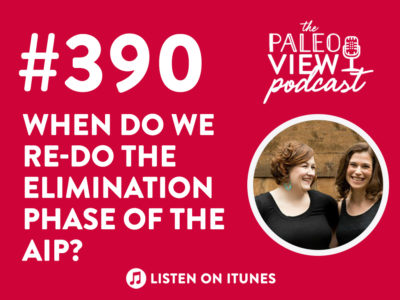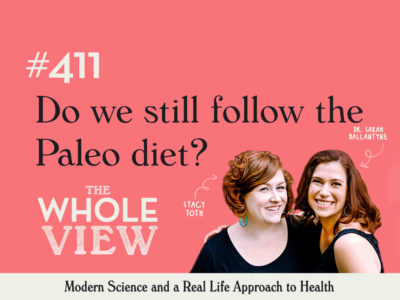In this episode, Stacy and Sarah talk about if a little gluten now and then is so terrible for most people. Plus, they discuss genetic susceptibility to having issues with gluten.
Click here to listen in iTunes
or download and listen by clicking the PodBean Player below
![]()
If you enjoy the show, please review it in iTunes!
The Paleo View (TPV), Episode 293: Do I Have to Be Gluten-Free Forever?
- Intro (0:00)
- News and Views (0:40)
- Get ready listeners, this episode is loaded with bloopers at the end!
- Stacy is traveling and Sarah has a speaking engagement so they recorded this podcast a week early.
- Stacy is amazed at how her and Sarah’s friendship has lasted because Sarah is so positive and enthusiastic, and Stacy is sardonic and sarcastic!
- Stacy and family are headed off on a cruise, which was the boys’ Christmas gift.
- They are all unplugging, not getting wifi on the ship.
- Stacy has been trying to prepare ahead for this!
- The boys chose Jamaican bobsledding as an excursion, which Stacy is crazy excited for!
- Sarah is looking forward to nerding-out on Jamaican bobsled history with them!
- The boys have never been out of the country before, they had to get passports.
- After the cruise, they are going to visit the Kennedy Space Center and then head over to Sarah’s house.
- Sarah is planning Kalua Pork and Stacy requested Ambrosia Salad.
- They are all unplugging, not getting wifi on the ship.
- Sarah chaperoned a sleep-away field trip a couple weeks ago with her daughter’s class.
- She had an amazing experience and it was great bonding time with her daughter.
- It was long, exhausting days but she loved the curriculum and everything they learned.
- She is still catching up on sleep.
- Listener Question (16:27)
- Gina asks, “Since late last year I have started listening to your podcast and I LOVE all the information you both share.. I have gone back and listened to so many old podcasts. My question for you is late last year I started seeing a registered dietitian to help lose weight (20 pounds overweight). I am active and eating for the most part a clean diet. I have not adopted a Paleo Diet as I eat very little meat protein. I am obsessed with eating healthy reading labels and trying to feed my family as healthful as possible.I had a Vibrant Wellness sensitivity test done I had 3 positive foods and 9 Moderate foods, Gluten Containing Grains and Gluten Free grains were among that list. With this information I had the gene test done for Celiac and I tested positive for the DQ8. And then also further had a wheat zoomer test done that, that came back showing some high risk for some of these panels. I was told I have leaky gut and to avoid gluten now for LIFE ahhhh.My husband and sister were also tested and both carrying a celiac gene. I just read your post on The Celiac Gene and am still confused. Do I need to avoid gluten forever, can I have some every once and awhile? I never noticed any symptoms that bothered me. When on vacation recently I did have pasta that wasn’t GF. I didn’t feel great after that but nothing that would stop me from eating again. I feel less bloated but not seeing weight loss. I don’t do well with being told NOT to have something. Will I develop Celiac disease if I continue to eat it gluten? Are my kids at risk since my husband and I both carry this gene?I know you both talk about that you and your family are gluten-free, I just don’t know that I can do this 100% of the time. Is this really going to affect my body if we continue to allow some gluten in our diet? Any help or suggestions would be greatly appreciated!!!!”
- Stacy says that if it were her and she found out she had a hereditary disposition to gluten, she wouldn’t personally eat it.
- Stacy is also a control freak and doesn’t like being told what to do.
- She tells herself that she is choosing not to eat gluten, not that she “can’t.”
- Sarah doesn’t subscribe to the dogma of everyone must be 100% gluten free all the time.
- The idea that we haven’t adapted to eating modern foods is oversimplified.
- She talks in depth in Paleo Principles about a study that compared genes over time, and they did find genetic adaptation in some areas.
- One example is that some people have adapted to producing lactase into adulthood, called lactase persistence, which depends largely on your heritage.
- The Celiac genes HLADQ2 and HLADQ8 are genetic adaptations related to the advent of agriculture.
- This probably indicates we have had some adaptations to modern agriculture.
- There is an incomplete understanding of how we’ve adapted to neolithic foods.
- This suggests that not everyone needs to be gluten free 100% of the time.
- Gluten-containing foods are not nutrient-dense foods.
- There is a definitive link now between gluten and weight-gain.
- There are other inflammatory compounds in gluten.
- Wheat germ agglutinin can carry across the gut barrier and is highly inflammatory.
- There isn’t a case to be made that gluten is a health food.
- There is evidence that some people can tolerate gluten.
- Gluten is inflammatory in all of us.
- Even if you can tolerate gluten with no obvious effects, it is not a health-promoting food.
- Gluten can affect people in a multitude of ways, from acne, sinus congestion, headaches, joint pain… it isn’t just bloating and gut symptoms.
- Many people use travel as an excuse to consume gluten, which seems the opposite of what you might want- to feel your best and have a great immune system when exposed to germs.
- Stacy likes to test the waters with her grey-area foods when she knows she can deal with the consequences like joint pain or skin breakouts.
- The difference in people who can tolerate gluten on occasion and people who can’t touch it with a 10-foot pole is complex and has to do with the magnitude of symptoms and recovery time.
- Implications of gluten consumption in non-Celiacs with Celiac risk genes is an important topic.
- 97% of Celiac disease sufferers have one or both gene variants.
- These genes relate to zonulin production.
- Zonulin is released by the gut cells when we eat gluten (in everyone.)
- It acts on the tight junctions between the cells of the intestines.
- This increases intestinal permeability, which allows things to get into the body which shouldn’t be in the body.
- In Celiac disease this response is magnified, which allows all kinds of things into the body.
- This drives body-wide inflammation.
- It acts on the tight junctions between the cells of the intestines.
- Recent studies have shown that those with the Celiac genes but not diagnosed with Celiac disease have the same magnified reaction to gluten with zonulin production.
- This may happen to everyone with one or both of genes.
- How prevalent is this? In North America, 55% may have one of these genetic variations.
- These genes are also associated with other autoimmune diseases and health problems.
- Zonulin is released by the gut cells when we eat gluten (in everyone.)
- Their science is pretty conclusive that this 55% that have a genetic susceptibility to Celiac disease are going to have health problems related to gluten consumption.
- How do you live your life and feed your family 100% gluten-free.
- Reading labels is a great start!
- Learn to be assertive with eating out and talking to restaurant staff, asking them to double check.
- Being prepared is important- always pack protein and gluten-free snacks. Stacy’s family loves:
- Rx Bars
- Beef jerky and meat sticks like Roam and Chommps
- Paleo Power Balls
- Epic Pork Rinds
- Research ahead of time where you are traveling to.
- Cooking at home and replacing grains with more vegetables, fats, and proteins means you will win on the nutrient front.
- There are gluten-free replacements for just about anything- these make great transitions foods.
- Know your currency food, if you can just have that one thing, everything else will be easier.
- For Sarah, this is chocolate and coffee.
- If your currency is a grilled cheese sandwich on gluten-free bread on Sunday afternoon and that’s what it takes to keep you going the rest of the week, then that’s okay.
- It does get better and easier the more you eat that way.
- There are so many tools available for going gluten-free now, that weren’t there even 5 years ago.
- The more you focus on the good that is happening in your body, the purpose, and what you can have, the easier it becomes.
- Stacy says that if it were her and she found out she had a hereditary disposition to gluten, she wouldn’t personally eat it.
- We hope you all have a lovely spring break- whether you are traveling or having a staycation.
- If you’ve enjoyed the show, please recommend it to someone who might enjoy it.
- We love when you share and when you leave reviews for us! Thanks for listening!
- Gina asks, “Since late last year I have started listening to your podcast and I LOVE all the information you both share.. I have gone back and listened to so many old podcasts. My question for you is late last year I started seeing a registered dietitian to help lose weight (20 pounds overweight). I am active and eating for the most part a clean diet. I have not adopted a Paleo Diet as I eat very little meat protein. I am obsessed with eating healthy reading labels and trying to feed my family as healthful as possible.I had a Vibrant Wellness sensitivity test done I had 3 positive foods and 9 Moderate foods, Gluten Containing Grains and Gluten Free grains were among that list. With this information I had the gene test done for Celiac and I tested positive for the DQ8. And then also further had a wheat zoomer test done that, that came back showing some high risk for some of these panels. I was told I have leaky gut and to avoid gluten now for LIFE ahhhh.My husband and sister were also tested and both carrying a celiac gene. I just read your post on The Celiac Gene and am still confused. Do I need to avoid gluten forever, can I have some every once and awhile? I never noticed any symptoms that bothered me. When on vacation recently I did have pasta that wasn’t GF. I didn’t feel great after that but nothing that would stop me from eating again. I feel less bloated but not seeing weight loss. I don’t do well with being told NOT to have something. Will I develop Celiac disease if I continue to eat it gluten? Are my kids at risk since my husband and I both carry this gene?I know you both talk about that you and your family are gluten-free, I just don’t know that I can do this 100% of the time. Is this really going to affect my body if we continue to allow some gluten in our diet? Any help or suggestions would be greatly appreciated!!!!”









